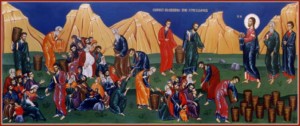Divine Providence and Human Anxiety

In the Sermon on the Mount (Matthew 5-7), Jesus proposes that the life of the faithful should depend entirely on the Providence of God. This concept appears to be in direct contrast with the contemporary way of materially focused life. Whereas all those who want to follow Him should live a life exclusively dedicated to God, and not care about money and wealth (mammon).
This clear-cut attitude of Jesus appears to imply that the Christian life and the pursuit of wealth, even if created by dedicated and honest work, are incompatible. Jesus could not have meant these words in this way, having regard to His love and compassion for mankind. However, these ideas are not meant for the Apostles or monastics alone, but it is an invitation to all those who wish to be called disciples of Christ.
Here, the topic is the cultivation of a true relationship of man with God through true and sincere almsgiving (6:1), prayer (6:5), forgiveness (6:14), and fasting (6:16).
Jesus does not ask us to trust the true God in contrast to some false deity, but in contrast to material wealth. In the Gospel we read “You cannot serve God and mammon” (6:24). Mammon which is the most powerful of all idols. Wealth and plutocracy were, are, and will be, the permanent ruler of the world, the constant antichrist.
Where wealth is not gratefully acknowledged as being bestowed by God’s providence and is not deployed for godly purposes, but rather is attained as a product of greed and desire, that wealth produces injustice, feeds crime, corrupts souls and bodies.
To become His disciples, Jesus warns us to weigh our needs carefully and make our choices accordingly.
The problem for us is to establish a true relationship with God, since the central problem is not whether one can acquire material wealth or not, but the excessive anxiety and agony it produces in those who live away from God Himself. That is why Jesus concludes His advice: ‘do not worry, saying, ‘What shall we eat?’ or ‘What shall we drink?’ or ‘What shall we wear?’ For after all these things the Gentiles seek. For your heavenly Father knows that you need all these things’ (6:31-32).
Matthew Chapter 6 contains a declaration of Jesus that everything depends on the manner we judge things of the world. “If therefore your eye is good, your whole body will be full of light. But if your eye is bad, your whole body will be full of darkness.” (6:22-23). Jesus warns us to avoid this blindness of the mind caused by avarice and greed at all costs, as it makes one unable to distinguish between the true and the faulty.
It is not possible for people to be attached to wealth whilst remaining attached to God. The power of wealth will eventually deprive them of all forms of spiritual life. For this reason we hear the Apostle Paul saying: “put to death your members which are on the earth: fornication, uncleanness, passion, evil desire, and covetousness, which is idolatry” (Col 3:5).
When thinking about worldly matters, we would do well to ask: “Can one be an idolater and a disciple of Jesus at the same time?”
Source: Lychnos August–September 2020
